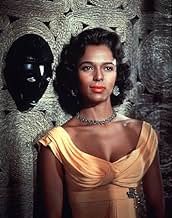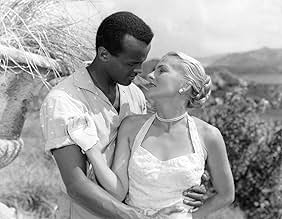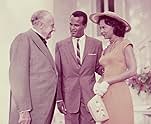CALIFICACIÓN DE IMDb
6.1/10
1.5 k
TU CALIFICACIÓN
Maxwell Fleury está en una batalla política contra el líder laborista David Boyeur. Boyeur tiene un amante secreto, la esposa de Fleury, Sylvia está teniendo una aventura y un aristócrata ha... Leer todoMaxwell Fleury está en una batalla política contra el líder laborista David Boyeur. Boyeur tiene un amante secreto, la esposa de Fleury, Sylvia está teniendo una aventura y un aristócrata ha sido asesinado.Maxwell Fleury está en una batalla política contra el líder laborista David Boyeur. Boyeur tiene un amante secreto, la esposa de Fleury, Sylvia está teniendo una aventura y un aristócrata ha sido asesinado.
- Dirección
- Guionistas
- Elenco
Jack Armstrong
- Snooker Player at Santa Marta Club
- (sin créditos)
Patrick Halpin
- Santa Marta Club Member
- (sin créditos)
Victor Harrington
- Snooker Player at Santa Marta Club
- (sin créditos)
- Dirección
- Guionistas
- Todo el elenco y el equipo
- Producción, taquilla y más en IMDbPro
Opiniones destacadas
This came out when I was 9 and my cousin and I saw it at a theater 7 times! It was the first time I gave any attention to an adult movie! I have seen it a few times over the last many years and It still is provocative to me. When I was 9 I did not fully understand the interracial thing, and I was brought up to ignore color. What I remember was imagining what happened when the film faded out at the height of intense moments. What me imagine happening is far worse than anything they could ever show on film. that fact that it was shot in a beautiful location was not lost on my 9 year old mind and for years dreamed of living in a beautiful island paradise. The music ie: title song I learned every word! Unlike others who saw this 30 years later and through adult eyes with agendas of their own, I lived the editing, the acting and the photography. I sometimes think people expect to much out of a movie. It is after all, just entertainment! Watch this movie, without preconceived notions of script, editing, story etc, enjoy it!
Very easy to imagine this happening throughout the world. The setting of the film (island) creates the microcosm that drives the conflicts of the plot, much like Casablanca. The theme of desire throughout the film helps this wonderful cast create characters you can enjoy and understand, their motives quite transparent. The scene with Harry Belafonte (David Boyeur) singing with the fishermen hauling in the nets stands out. John Williams, who is always brilliant in such roles, works his magic to provoke and entrap James Mason's Maxwell Fleury into confessing his murder. Dorothy Dandridge is lovely as Margot, and the subplot of her love affair keeps the hope for happy endings alive in the film. The cinematography helps to develop the exotic yet isolating setting, and the sets do well to set the tone of the lifestyle (luxurious) of the prominent characters who live under the mercy of desire in the human condition. The themes of this film transcend its setting, and I imagine this film to have been quite enlightening to those who viewed it in 1957. Really enjoyed this film, even in its length.
"Island in the Sun" was filmed in Barbados and Grenada, though it's about a fictional British colonial island...roughly like Barbados or Grenada! In many ways, it's a film about the racism inherent in colonialism and in other ways is a soap opera set on a tropical island. It also features something shocking for its time...and interracial romance between Joan Fontaine and Harry Belafonte...something which, sadly, caused a bit of a commotion when it debuted.
The movie is odd in that it seems to have many, many plots...too many for my taste. Much of it involves the Fleury family-- especially the incredibly strange character played by James Mason. But in addition to the Fleurys, there are many others--and the common thread to all of this is soapy romance. Many of the romances are interracial and the stories thrust seems to be that with the ending of colonialism comes the elimination of racial boundaries in love.
As I mentioned, I actually think the film has too many plots. I also thought Mason's character was enough for one film....so either the film should have been all about him OR they should have eliminated him completely. Regardless, it's a confusing sort of film--with many excellent moments but not nearly enough focus. Decent but the film could have been so, so much better...especially since so many things that are brought up in this film are important and deserve a better presentation.
The movie is odd in that it seems to have many, many plots...too many for my taste. Much of it involves the Fleury family-- especially the incredibly strange character played by James Mason. But in addition to the Fleurys, there are many others--and the common thread to all of this is soapy romance. Many of the romances are interracial and the stories thrust seems to be that with the ending of colonialism comes the elimination of racial boundaries in love.
As I mentioned, I actually think the film has too many plots. I also thought Mason's character was enough for one film....so either the film should have been all about him OR they should have eliminated him completely. Regardless, it's a confusing sort of film--with many excellent moments but not nearly enough focus. Decent but the film could have been so, so much better...especially since so many things that are brought up in this film are important and deserve a better presentation.
This was a very unique movie for Hollywood in the 1950s because it explored interracial relationships from both a political as well as romantic perspective. No doubt, it made audiences extremely uncomfortable.
The cast is very strong (with Dorothy Dandridge, Joan Fontaine, John Williams and James Mason--who never disappoints,) and the storyline both intriguing and unpredictable. Harry Belafonte portrays a proud, outspoken labor leader who fights racial injustice on a British Caribbean island, but this is only a secondary plot line. The "forbidden fruit" of interracial relationships is explored from several different perspectives giving this movie an important place in the history of American Cinema. Although racism and class-ism are common elements, the characters are empathetically portrayed. This movie was released in Jim Crow America and, younger viewers may not fully appreciate its' unique portrayal of Blacks in non-subservient roles. Blacks were typically cast as inarticulate maids and butlers, but Dorothy Dandridge (nominated as Best Actress for Carmen Jones in 1954) and Harry Belafonte (a top ten pop singer) were particularly stunning and sophisticated, an anomaly for Black actors in films roles at the time. Nevertheless, Belafonte's acting is often stilted, revealing that this was an early role while Dandridge's character lacks depth--though her acting superb, given that she has been given so little with which to work.
An important side note is that Harry Belafonte was a top-selling West Indian Calyso singer (Day-0-The Banana Boat Song) at the time that this movie was released and performed the title song. In addition to making a strong political statement about the need for racial justice--via his character in this film--he also was a high-profile figure within the Civil Rights Movement, marching with the Reverend Doctor Martin Luther King.
The cast is very strong (with Dorothy Dandridge, Joan Fontaine, John Williams and James Mason--who never disappoints,) and the storyline both intriguing and unpredictable. Harry Belafonte portrays a proud, outspoken labor leader who fights racial injustice on a British Caribbean island, but this is only a secondary plot line. The "forbidden fruit" of interracial relationships is explored from several different perspectives giving this movie an important place in the history of American Cinema. Although racism and class-ism are common elements, the characters are empathetically portrayed. This movie was released in Jim Crow America and, younger viewers may not fully appreciate its' unique portrayal of Blacks in non-subservient roles. Blacks were typically cast as inarticulate maids and butlers, but Dorothy Dandridge (nominated as Best Actress for Carmen Jones in 1954) and Harry Belafonte (a top ten pop singer) were particularly stunning and sophisticated, an anomaly for Black actors in films roles at the time. Nevertheless, Belafonte's acting is often stilted, revealing that this was an early role while Dandridge's character lacks depth--though her acting superb, given that she has been given so little with which to work.
An important side note is that Harry Belafonte was a top-selling West Indian Calyso singer (Day-0-The Banana Boat Song) at the time that this movie was released and performed the title song. In addition to making a strong political statement about the need for racial justice--via his character in this film--he also was a high-profile figure within the Civil Rights Movement, marching with the Reverend Doctor Martin Luther King.
Hollywood was clearly not ready for this type of drama, which is full of compromise. Screen lovers Dorothy Dandridge and John Justin are clearly not allowed to kiss. Ditto for Joan Fontaine and Harry Belafonte (incidentally, Fontaine's comment about the two of them being children together should have been left out; she looks good, but it's still obvious that she's a good ten years older than he.)
¿Sabías que…?
- TriviaJoan Fontaine received hundreds of hate letters, containing dimes and quarters, which read, "If you're so hard up that you have to work with a nigger..." They were post-marked from various parts of the country, but they seemed to be dictated by one organization, as many of the phrases were identical. Fontaine turned the letters over to the FBI.
- Citas
Mavis Norman: Do you care what stupid, prejudiced people think?
David Boyeur: You've never had to fight stupidity or prejudice.
- ConexionesFeatured in Biography: Darryl F. Zanuck: 20th Century Filmmaker (1995)
Selecciones populares
Inicia sesión para calificar y agrega a la lista de videos para obtener recomendaciones personalizadas
- How long is Island in the Sun?Con tecnología de Alexa
Detalles
Taquilla
- Presupuesto
- USD 2,250,000 (estimado)
- Tiempo de ejecución1 hora 59 minutos
- Color
- Relación de aspecto
- 2.35 : 1
Contribuir a esta página
Sugiere una edición o agrega el contenido que falta





































